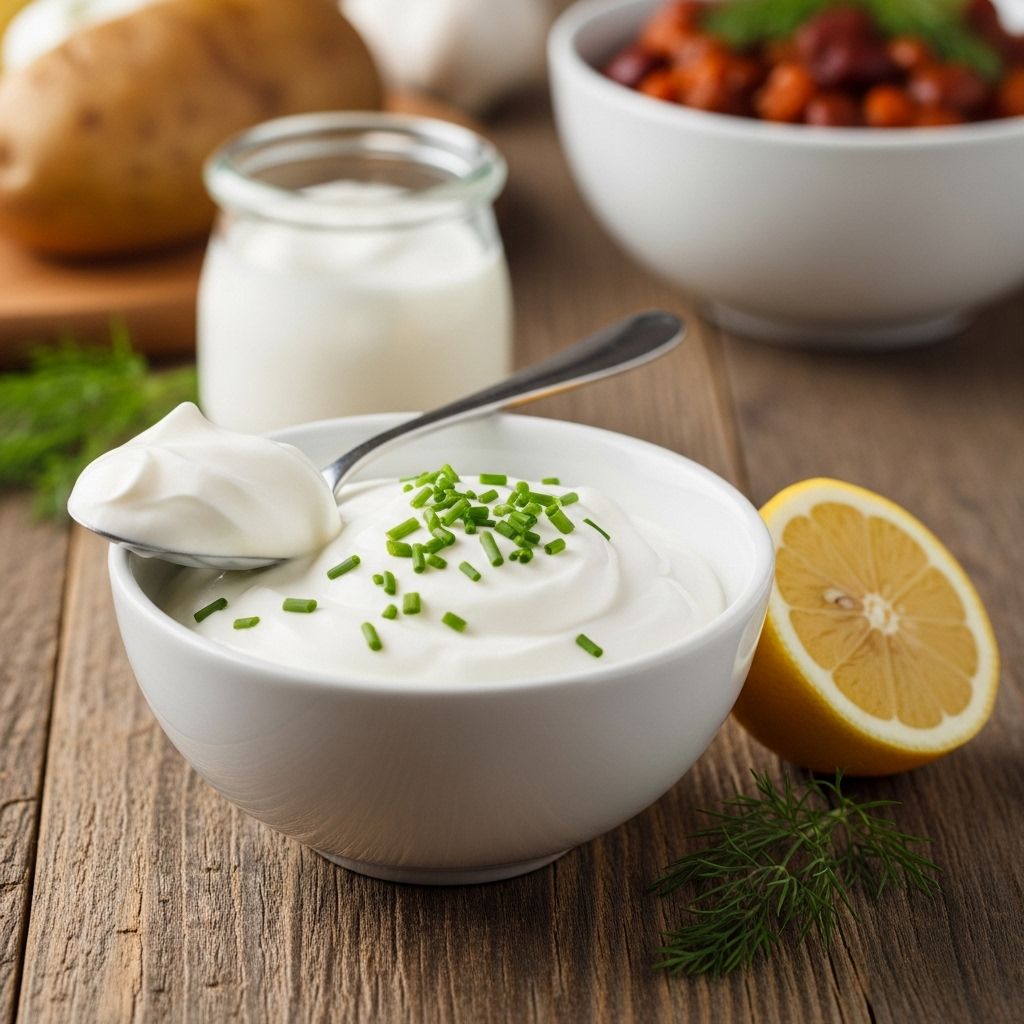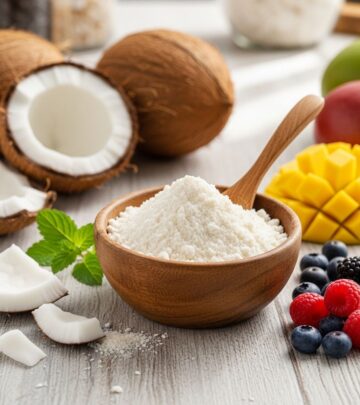Sour Cream Nutrition: Health Benefits, Facts & Expert Tips
Mindful pairings and portions unlock the creaminess you love with fewer calories and fat.

Sour cream is a popular creamy dairy product used worldwide to enhance the taste and texture of countless dishes. While loved for its tangy flavor and velvety texture, many people wonder about its nutritional merits, potential benefits, and how it fits in a healthy diet. This detailed guide covers everything you need to know about sour cream nutrition, its pros and cons, and how to enjoy it wisely.
What Is Sour Cream?
Sour cream is produced by fermenting regular cream with specific lactic acid bacteria. This process thickens the cream and gives it its characteristic tangy taste. Traditionally, it is used as a topping for baked potatoes, chili, and soups, as well as a base for dips and salad dressings. Commercial versions are available in regular, reduced-fat, and fat-free varieties, each differing slightly in taste, texture, and nutrition.
Nutritional Value of Sour Cream
The nutrient profile of sour cream depends on the type and portion size. Although it is rich and creamy, sour cream is generally consumed in small amounts, commonly as a garnish or topping.
Basic Nutrition Facts
| Component (per 2 tbsp / 30g) | Regular | Reduced-Fat | Fat-Free |
|---|---|---|---|
| Calories | 59 | 40 | 22 |
| Total Fat (g) | 5.8 | 3.6 | 0 |
| Saturated Fat (g) | 3 | 2 | 0 |
| Protein (g) | 0.7 | 1 | 1.2 |
| Carbohydrates (g) | 1.3 | 2.4 | 3.8 |
| Calcium (% DV) | 3% | 4% | 4% |
| Vitamin A (% DV) | 4% | 5% | 7% |
DVs are based on a 2,000 calorie per day diet.
Key Points
- Calories and fat: Regular sour cream is high in fat and calories compared to its reduced-fat and fat-free versions.
- Protein: Relatively low (less than 1g per 2 tbsp), especially compared to yogurt or cottage cheese.
- Carbohydrates: Low carb (about 1-2g per serving), making it keto-friendly in moderation.
- Vitamins and minerals: Contains small amounts of calcium, phosphorus, potassium, and vitamins A and B12, but not a significant source for most people.
- Glycemic Index: Low to moderate (~35-56), meaning it has a minimal impact on blood sugar when consumed in typical servings.
Micronutrient Content
Sour cream provides modest levels of certain vitamins and minerals:
- Calcium: Supports bone and dental health
- Phosphorus: Important for bone and energy metabolism
- Vitamin A: Supports vision and immunity
- Vitamin B12: Crucial for nerve function
- Potassium: Helps with fluid balance (but present in small amounts)
While it contains these nutrients, the quantities are not substantial since typical serving sizes are small.
Health Benefits of Sour Cream
Despite being used mostly for taste and texture, sour cream offers a few noteworthy health benefits:
- Provides healthy fats: Regular sour cream is a source of dairy fat, which helps with satiety and supports the absorption of fat-soluble vitamins.
- Contains protein (small amount): Supports muscle maintenance, although other dairy products are better sources.
- Good source of calcium: Promotes strong bones and teeth.
- Can support gut health: If made from cultured (live bacteria) cream, it may provide beneficial probiotics, which contribute to digestive wellness.
- Enhances flavor and texture: Adding sour cream to meals can make healthy foods such as vegetables and potatoes more palatable, helping you enjoy nutritious dishes.
Is Sour Cream Good for Weight Loss?
Sour cream itself is calorie dense, especially in the regular variety, but the fat content can increase satiety. Using small amounts can enhance flavor without excessive calorie intake. If you are managing your weight, opt for reduced-fat or fat-free varieties, and use sparingly to avoid surplus calories.
Potential Drawbacks of Sour Cream
While sour cream can be a tasty addition to your diet, moderation is key. Here are some considerations:
- High in saturated fat: Regular sour cream contains about 3g saturated fat per 2 tablespoons, which can add up quickly. High intake of saturated fat is linked to heart health risks. Opt for reduced-fat or fat-free variants if limiting saturated fats.
- Not a significant protein source: If you’re looking for protein, Greek yogurt or cottage cheese are better choices.
- May contain additives: Fat-free and low-fat sour creams often include thickeners, starches, or stabilizers to maintain consistency.
- Lactose content: Sour cream contains lactose, which may cause digestive issues for people who are lactose intolerant.
Types of Sour Cream
There are several varieties of sour cream. Understanding the differences helps you choose the best option for your goals.
- Regular Sour Cream: Made from cultured cream, typically contains 18–20% milk fat. Rich taste and creamy texture.
- Reduced-Fat Sour Cream: Made from low-fat milk and cream, contains around 40% less fat than the regular version. Slightly tangier and less creamy.
- Fat-Free Sour Cream: Made from nonfat milk and thickeners. Very low in calories and fat, higher in carbohydrates, with a lighter texture.
- Imitation Sour Cream: Some non-dairy versions (e.g., vegan, lactose-free) use plant-based bases and additives to mimic taste and texture.
How to Use Sour Cream Wisely
- Portion control: Use small amounts (1–2 tablespoons) to keep calorie and fat intake in check.
- Pair with nutrient-rich foods: Use as a dip for fresh vegetables or as a dollop on whole-grain dishes and lean proteins.
- Substitute smartly: Replace full-fat sour cream with Greek yogurt in recipes for extra protein and fewer calories.
- Check ingredient labels: Particularly with fat-free and low-fat options, to identify unwanted fillers and additives.
Nutritional Comparison: Sour Cream vs. Other Dairy Products
| Product (per 2 tbsp) | Calories | Protein (g) | Fat (g) | Carbs (g) | Calcium (% DV) |
|---|---|---|---|---|---|
| Sour Cream (regular) | 59 | 0.7 | 5.8 | 1.3 | 3% |
| Greek Yogurt (plain, non-fat) | 20 | 2.9 | 0.1 | 1.5 | 3% |
| Cottage Cheese (low-fat, 1%) | 20 | 2.6 | 0.3 | 0.7 | 2% |
Greek yogurt and cottage cheese offer more protein per serving and less fat/calories compared to regular sour cream, making them better choices for high-protein, low-calorie diets.
Shopping and Storage Tips
- Choose clean ingredients: Prefer brands with minimal additives, especially cultured sour cream with live active cultures.
- Check fat content: Select the variety that best fits your dietary goals.
- Storage: Keep sour cream refrigerated and use within the expiry date. After opening, consume within 1–2 weeks for optimal freshness.
- Avoid cross-contamination: Use clean utensils to prevent spoilage and foodborne illness.
Is Sour Cream Suitable for Everyone?
Sour cream is generally safe and healthy when consumed in moderation by most people, but certain groups should be cautious:
- Lactose intolerant individuals: May experience discomfort after consuming sour cream.
- Individuals with milk/dairy allergy: Should avoid standard dairy-based sour cream or seek out plant-based alternatives.
- Those monitoring saturated fat: If at higher risk for heart disease, opt for reduced-fat or fat-free versions or enjoy sparingly.
Frequently Asked Questions (FAQs)
Q: Is sour cream a good source of protein?
A: No, sour cream contains very little protein per serving. For higher protein needs, opt for foods like Greek yogurt, beans, or lean meats.
Q: Can I eat sour cream on a low-carb diet?
A: Yes, sour cream is low in carbohydrates and fits well into most low-carb and ketogenic diets when eaten in moderation.
Q: Does sour cream have probiotics?
A: Some sour creams made from cultured milk contain live probiotics, but not all brands guarantee active cultures. Check the label for “live active cultures” for probiotic benefits.
Q: Is fat-free sour cream healthier?
A: Fat-free varieties are lower in calories and saturated fat, but may contain more carbohydrates and additives. Choose based on your dietary needs and preferences.
Q: How should I store sour cream?
A: Keep refrigerated, tightly sealed, and use within the recommended timeframe after opening to maintain freshness and safety.
Expert Tips for Healthy Enjoyment
- Use sour cream as a garnish, not a main ingredient, to add flavor with minimal calories.
- Pair with fiber-rich foods (vegetables, whole grains) for more filling meals.
- Try swapping sour cream with Greek yogurt in dips or sauces for added nutrition.
Takeaway
Sour cream can add delicious tang and creaminess to many dishes, and offers some nutritional value—mainly small amounts of calcium and vitamin A. However, because standard servings are small and calorie content is relatively high, it is best enjoyed mindfully. To maximize health benefits, choose plain cultured varieties, practice portion control, and combine with nutrient-dense foods for a balanced diet.
References
- https://listonic.com/p/nutrition/sour-cream
- https://www.urmc.rochester.edu/encyclopedia/content?contenttypeid=76&contentid=01074-1
- https://www.healthline.com/nutrition/is-sour-cream-healthy
- https://www.noom.com/blog/nutrition/sour-cream-for-weight-loss/
- https://www.americandairy.com/health-wellness/benefits-of-dairy/sour-cream/
- https://www.relish.com/food-wiki/153757/sour-cream-important-facts-health-benefits-and-recipes
- https://www.usatoday.com/story/life/health-wellness/2023/12/04/is-sour-cream-healthy/71714788007/
- https://www.drsegals.com/blogs/news/is-sour-cream-good-for-you
Read full bio of medha deb













